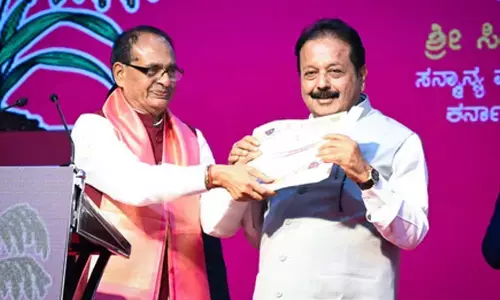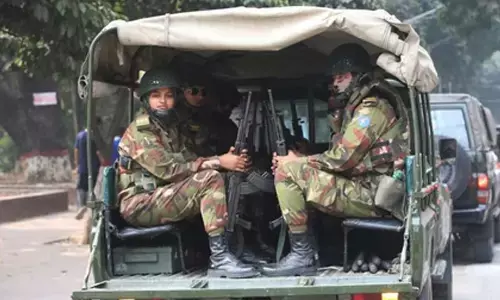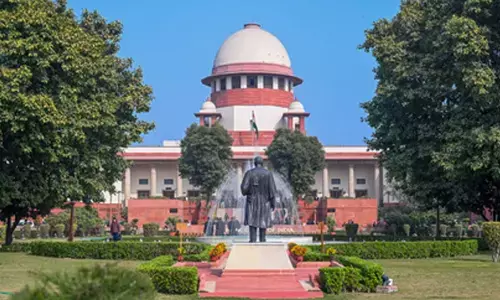Women vulnerable to violence in cyber world too

Dr R Akhileshwari: Women Vulnerable to Violence in Cyber World Too, Cyber space is now the new world. For children, teenagers, students, women and politicians. It is being used to communicate, to share, to be in touch, to gain support, to fight against social and other ills and so on.
Cyber space is now the new world. For children, teenagers, students, women and politicians. It is being used to communicate, to share, to be in touch, to gain support, to fight against social and other ills and so on. It is also the new political weapon as seen in the election of Obama and now in the election campaign of Narendra Modi. If social media can be used, it can be misused tremendously too, to create false numbers of support, to vilify political opponents, to spread misinformation and for perpetrating all kinds of crime. Typically, women are the major victims as they face violence, abuse and humiliation.

Cyber world provides space to women. It gives her freedom to voice her opinion, pour out her frustrations, angst or even anger; spell out her dreams. It is where she can share her world with others to find solidarity, affirmation and support. But danger lurks in the cyber world just as in the physical world, in the form of stalking, vilification and verbal abuse. A woman is as vulnerable in cyber space as in physical space. Men intimidate her and seek to shut her up, discourage her from expressing herself. Any expression of opinion, assertion is an invitation to contempt, ridicule, abuse and harassment. Increasingly, cyberspace is being used to wreak vengeance, vendetta and to punish women.
For example, recently, a middle aged man was arrested in Hyderabad for sending vulgar messages online and posting morphed pictures of a young woman, whom his son loved. When the father refused to agree to their marriage, the son left home in anger. The father, holding the young woman responsible for his plight, resorted to the social media to punish her by abusing her and defaming her. In another instance, a man posted obscene pictures of his wife after she left him on discovering that he had married her on false pretences. In both these cases, the culprits were arrested and are facing criminal action.
In West Bengal, a mother of two hanged herself after some youngsters morphed her picture and circulated it which became the talk of the town. The young woman took her life unable to bear the humiliation, killed herself. In Andhra Pradesh again, a dismissed manager took vengeance on his former boss by posting the phone numbers of his boss and his mother under their names on sex websites. He too was arrested.
Cyber world prone to abuse
What makes the cyber world so prone to abuse? Anonymity, for one. It is easy for culprits to target their victims. The cyber world provides a mask to abuse, insult and harass people and especially those who voice an opinion that is different. Experience of cyber citizens in India has shown that the most virulent abuse is reserved for supporters of Pakistan, liberal or progressive opinion and women.
Cyber crime against women includes harassing through email, cyber stalking, cyber defamation, morphing, email spoofing, hacking, cyber pornography, cyber flirting and cyber bullying. Other cyber crimes against women include posting vulgar comments and pictures on social media, morphed photographs, identity theft. Men are equally susceptible to all cyber crimes but women are in majority as victims. Studies show that a majority of cyber crimes are related to obscenity and about 75 per cent of the victims of such crimes are women. Youth and children are the next most targeted.
Andhra Pradesh is no exception. According to AP police, cyber crime against women has reached epidemic proportions. A survey by AP police has shown that half of the women internet users suffered from post-traumatic stress disorder. The proliferation of cyber crime against women prompted the AP police to set up special cyber crime investigation cells in Hyderabad, Cyberabad and Visakhapatnam. Soon, two-tier cities too will see similar cells being set up as Internet usage is spreading to semi-urban areas. The good news is that as awareness is growing among the people, more and more victims of cyber crime are lodging complaints with the police.
Why are women targeted?
Women are as much at risk for violence in the cyber space as in the physical world. As much hatred is directed at her in the cyber space as in the physical space. Since time immemorial, woman has been enslaved by men and any assertion by a slave is not to be tolerated. Assertion leads to questioning the legitimacy of the conquerors and therefore, man cannot and will not allow his hegemony over the woman to be threatened and hence, will disallow all kinds of assertions by the woman by using every means at his disposal. Check out the history: man has conquered people less powerful than himself, enslaved them, ruled over them, exploited them, used them and abused them. Through such conquests he increased his power exponentially. Colonialism and slavery are two examples. The white people put in place several systems to sustain and perpetuate their power and superiority. A similar system, patriarchy, was constructed for the woman. Every system whether social, economic, legal, religious and cultural, supported the man’s superiority, and logically, the inferior status of the woman. When one considers himself superior by criteria of colour of skin, religion, wealth or gender, abuse is almost a natural outcome. There is no dearth of instances of horrendous abuse in man’s history: apartheid in Africa, the systematic elimination of the Native Americans in the Americas, the anti-Semitism of Europe and the exclusion of Dalits from the mainstream in India.
Women, like slaves, have no rights
Another indicator of the women’s enslavement is the fact that she has no rights. Just as the slaves in the US, the Jews under the Third Reich and the Dalits in India since aeon, the woman has no rights, not on land, or property. She may have legal and political rights but they are subject to interpretation and implementation by man and therefore, she is denied those too. She has very little or no access to credit and markets. She gets very little education; even less justice. She has no voice politically.
Nor does she have economic strength. This inferior status of the woman, her dependency and her state of mental and emotional subjugation makes her weak and vulnerable to violence. Violence against women has reached epidemic proportions world-wide. It takes different forms, from physical to emotional to verbal. The newer the technology, the newer are the methods to subjugate women, emotionally, physically and mentally. When the physical world is so anti-woman, can the cyber world be any different? With patriarchy dominating every sphere and every institution, from religion to social laws and traditions, the cyber world is no different.










